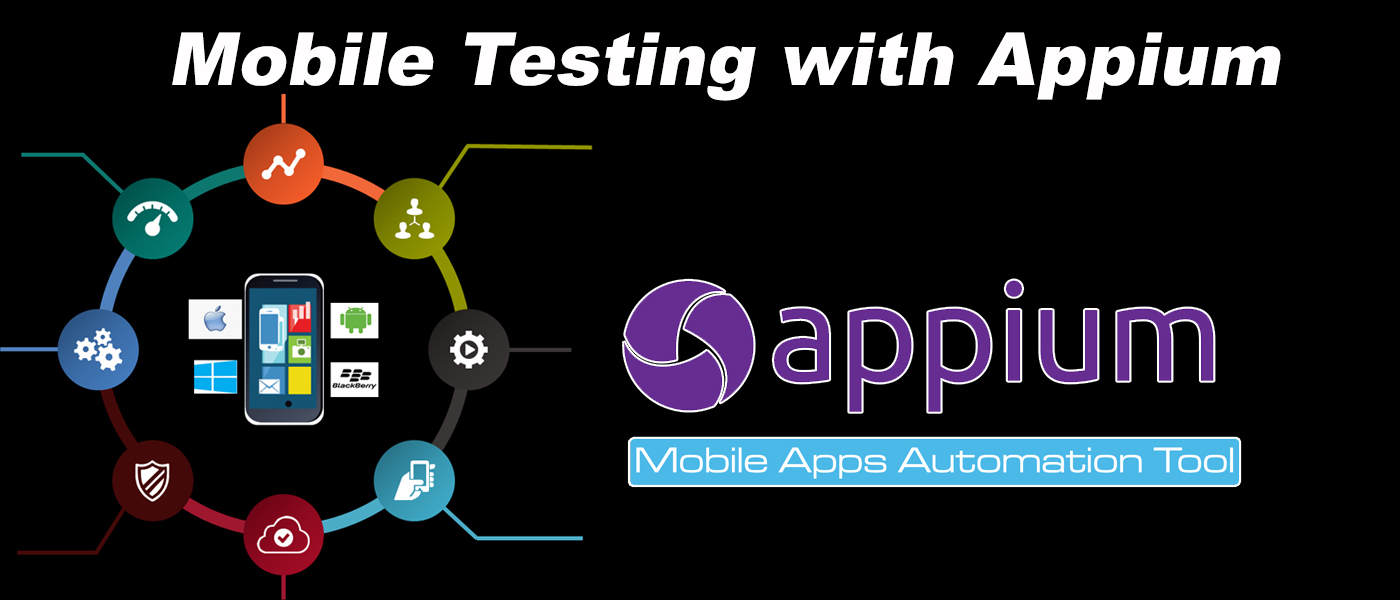
Mobile Testing With Appium
Mobile Testing With Appium Online Training :
Appium is an open-source tool for automating the testing of mobile applications. It allows developers and testers to write automated tests for native, hybrid, and mobile web applications on iOS and Android platforms. Appium uses the WebDriver protocol to communicate with mobile devices, which enables it to support a wide range of programming languages and testing frameworks.
Mobile application testing involves evaluating functional & non-functional characteristics of application softwares developed for Hand held devices such as mobile phones, tablets etc. Testing a mobile application across multiple devices running on the same platform and every platform poses a unique challenge for testers.
To use Appium for mobile testing, you first need to install the Appium server and the appropriate mobile platform tools (e.g. Xcode for iOS and Android SDK for Android) on your computer. Then, you can write test scripts using a programming language and testing framework of your choice (e.g. Java and JUnit for Android, or Swift and XCTest for iOS). You can then run your test scripts on a physical mobile device or an emulator/simulator, and Appium will automate the testing process by simulating user actions on the device and verifying the expected results.
Appium offers a number of advantages for mobile testing, including:
- Cross-platform compatibility: Appium supports both iOS and Android platforms, so you can use a single tool for testing your mobile apps on both platforms.
- Support for different app types: Appium can be used for testing native, hybrid, and mobile web apps, making it a versatile tool for different types of mobile projects.
- Wide language and framework support: Appium supports a wide range of programming languages and testing frameworks, so you can use the tools that you are already familiar with.
- Easy setup and configuration: Appium is an open-source tool, so it is freely available and can be easily installed and configured on your computer.
- Overall, Appium is a powerful and flexible tool for automating the testing of mobile applications. It can help developers and testers save time and effort by allowing them to write and run automated tests for their mobile apps.
Introduction to Appium & Mobile automation Testing
- Introduction to Mobile automation testing
- Selenium 3.0 and APIs
- Automation for IOS and Android devices
- Running the scripts on Emulators
- Running the scripts on Real devices
- Various tools available for Mobile automation testing
- Understanding the API Levels and Appium Concepts
- Client/Server Architecture, Session, Desired Capabilities, Appium Server and Appium Clients
- Installing JDK, Maven and Android SDK
- Pre-requisite for starting with Appium
- Supported Java versions
- Configuring environment variables
- Downloading and Installing JDK
- Downloading and installing Maven on Windows
- Downloading Android SDK
- Taking a look at available Android Virtual Devices
- Basic installation for Appium on Windows
- Visiting Appium.exe
- Downloading Appium for Windows
- Downloading Appium jars and other dependencies
- Configuring SDK Manager
- Downloading different Android API levels
- Setting up Android environment variables
- Downloading Appium GUI Tool
- Understanding Application path, Package & Launch Activity
- Starting Appium Server
- Running a sample test to make sure everything works fine
- Downloading Appium Dependencies
- Understanding Desired capabilities class
- Extracting Packages and Activities information of pre and post installed apps
- Downloading Appium Maven Dependencies
- Adding Device Name
- Connecting real device to USB and running ADB commands
- Starting the Appium server programmatically Windows OS
- Starting the Appium server through code / programmatically on Windows
- Downloading Appium Maven Dependencies
- Stopping the Appium server
- Kill all nodes
- UI Automator Viewer
- Opening UIAutomator Viewer through SDK tools kit
- Understanding different locator strategies
- Taking the Device screenshot
- Device screenshot with Compressed hierarchy
- Understanding the different locator tags
- Appium Inspector
- What is Appium Inspector?
- How and when to run it?
- Record and Play using Appium Inspector
- Locating elements with the help of Appium Inspector
- Inspector will only run with active session
- Object Repository
- What is object repository?
- How to use object repository in framework
- What is the use of maintain Object repository
- Types of creating object repository
- Additional Framework Features
- Execution with ANT
- Execution with Maven
- Execution with Continuous Integration tool i.e., Jenkins
- Object Locators and Techniques
- Locating Elements on the App
- What all can be locatable
- Locating elements within elements
- Locating multiple elements
- Find Element By Android UIAutomator
- Exploring UIAutomator API
- Finding Elements by ClassName
- Finding Elements by ids
- Finding Elements by Xpaths
- Using different functions inside UIAutomator class
- Exercises
Testing Android Native, Hybrid & Web Apps on Windows
- Native App Test – Making a call with Internal Dialer Application
- Native App Test – Adding a new contact to Phonebook
- Native App Test – Sending SMS from a real device
- Native App Test – Automating a standard App
- Touch Actions and Events – Handling user gestures
- WebApp Test – Automating Web based testing on Chrome Browser
- Hybrid App Test – Automating the mobile messaging app
Unit Test Framework
- JUnit Introduction
- JUnit Annotations
- JUnit Implementation in Selenium RC/ Web Driver Scripts
- TestNG Introduction
- TestNG Annotations
- TestNG Implementation in Selenium RC/ Web Driver Scripts
- Difference between JUnit and TestNG
- Java
- Setting up Java Environment in windows platform
- Object – Oriented Programming Concepts
- Classes and Objects, Interfaces , Encapsulation, Access and Non-Access Modifiers
- Variables , Methods and Arrays
- Inheritance, Abstraction and Polymorphism
- Collections , loop concepts and if-else statements
- File I/O, Exception Handling , Code Debugging and Java API Understanding
- Practice Programs in the Java Concepts
- JDBC – Database Testing Introduction
- Handling Sql Server database using JDBC scripts
Miscellaneous
- Resume Preparation
- Job Assistance
- Help of Interview Questions and Answers by Real-Time Faculty
Online Mobile Testing Training Full Course Content : Download Here
Our Courses
- AWS Online Training
- Hadoop Online Training
- Devops Online Training
- Tableau Online Training
- Informatica Online Training
- ServiceNow Online Training
- ReactJs Online Training
- BlockChain Online Training
- Salesforce Online Training
- Datascience Online Training
- Selenium with Python Online Training
- Selenium with Java Online Training
- Core Java Online Training
- SharePoint Online Training
- Sql Server Developer Online Training
- MSBI (MicroSoft Business Intelligence) Training
- Oracle DBA Training
- Pl Sql Developer 11g\12g Online Training
Testimonials
What are they saying


